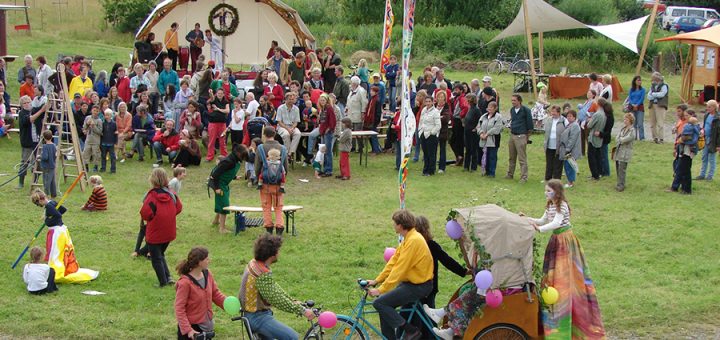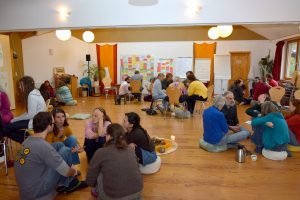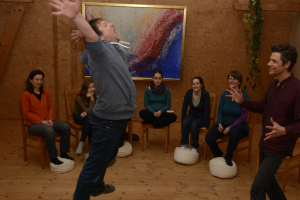
Social life
In times of shifts in society and ecological questions above all we dedicate ourselves to humaneness and to the responsibility for the world. Through our life and activities we express our connection with the Earth and its earthlings. Therefor many different paths are treaded, because the different pressing questions of today need different answers that are adjusted to people and conditions. In addition to a stewardship of available resources we align ourselves to a forward-looking mutual caretaking in life and economy. In this diversity the community reflects like a societal microcosm the basic issues of the world.

 Several communication methods are used by the community, in its daily life and in the intensive gatherings.
One method which was initially often used was the Forum, a specific communication tool which is presented below: this tool is nowadays less used by the community as many other methods are applied:
Several communication methods are used by the community, in its daily life and in the intensive gatherings.
One method which was initially often used was the Forum, a specific communication tool which is presented below: this tool is nowadays less used by the community as many other methods are applied:

Respect of diversity and development of a community vision
Sieben Linden defines itself as a social and ecological community aiming at developing cooperation between nature and human beings. A document presenting the objectives and strategies of the ecovillage has been written by the community: it can be found here in German or here translated . The guidances presented in this document do not constraint the future of the community and are meant to evolve: thus, the community is involved in an open process where new social and ecological experiments are received positively. This absence of constraints is sometimes perceived as a lack of unity in the community: the ecovillage members are proud of these differences and present themselves as “unity in diversity”.Inclusion process
Before having the possibility to move in the community, new members are asked to follow an inclusion process: this process is the opportunity to confirm that there is mutual interest and sympathy between new members and the community. It is also a way for the community to ensure that new members have performed the introspection necessary to be sure that they really want and can live collectively. After a first visit (through the summer camp or a workshop for example), the candidate have to follow several workshops which present the community and its functioning (more particularly the decision-making process). After these workshops, a 1 year trial period can be proposed to the candidate: the candidate will be officially introduced to the community and 2 tutors will be named to support the candidate during all the trial period, to find a place to live for the new member and define an activity enabling the candidate to provide for his needs. After the trial period, the community will vote to decide if the candidate can be accepted in the community.Guarantee of participatory leadership and shared governance
With the growing number of community inhabitants, the decision making through a systematic and general approval of all members was too time-consuming and was abandoned in 2008. A new process, based on the creation of several competent circles, was then implemented: the circles are responsible for taking the decisions they are in charge of and the community put its trust in the circles’ members to realize their activities. Six different circles are currently in function and elected every year: the housing cooperative WoGe, the land cooperative SiGe, Building management, the Freundeskreis Ökodorf eV, the Food Provision and the New Comers council. All decisions in the different circles are taken by consensus.
Four-choice consensus method
The most important decisions (for example, discussions about the number of new members that can be welcome in the community or the approval of important expenses) are still taken during the monthly general assemblies, where all community members are invited. A four-choice consensus method is now used in all general assemblies. This method has been developed by the community as many people were remaining silent despite not being in agreement with a decision: these members indeed chose not to express their opinion as they did not want to slow or even block the decision making-process. This new method seems to be a useful tool so that people can express their doubts on a proposal, without blocking it. Thus, all Sieben Linden’s members have four options to give their opinion about a proposal:- Yes: I’m fully supporting the proposal
- Obstain: I haven’t decided about it yet.
- No: I don’t support the proposal, but don’t want to block it.
- Veto: I don’t support the proposal and want to block it.
Use of communication skills, conflict facilitation
Relationships between members are the core of all the community project and, in that sense, they require to be handled with specific attention: facilitating communication between the community members has then been identified as one of the main means to reinforce the community. While all topics related to the community’s day-to-day life are handled by the working groups, the general assemblies and the circles, in-depth topics are discussed during community intensive dedicated times: At least 3 times a year, the community gathers for several days and shares about important changes or issues in the community. The objectives of these gatherings is to define the ideas which really gathers all the community members, beyond their differences, and make them feel as a coherent community. These dedicated times are of great importance for the community: a dedicated budget is available for this purpose and external well-known consultants are often invited in the community to guide the community. Several communication methods are used by the community, in its daily life and in the intensive gatherings.
One method which was initially often used was the Forum, a specific communication tool which is presented below: this tool is nowadays less used by the community as many other methods are applied:
Several communication methods are used by the community, in its daily life and in the intensive gatherings.
One method which was initially often used was the Forum, a specific communication tool which is presented below: this tool is nowadays less used by the community as many other methods are applied:
- Mindfulness exercises
- Meditations
- Fishbowl: it consists of 2 different concentric circles, the inner circle (called fishbowl circle) has around 5 seats and the outer one has enough space for everyone (listeners circle). Only the persons in the inner circle can discuss the proposed topic but everybody has the right to go to the inside circle if a seat is free: the group sitting in the inside circle should try to always keep one seat free for new people, and everyone within the fishbowl circle must leave the inner circle at some point in order to give space for others. This method gives the opportunity for all participants to express their opinion on the discussed topic.
- Open Space
- Way of Circle Sharings
- Active listening
Forum method
The Forum is a communication tool for groups which has been developed by the German ecovillage Zegg. During a Forum session, which lasts 90 minutes in its standard form, the group sits in a circle and the center space is used as a stage where everybody can bring any thought or feeling to others: one by one, the successive presenters enter the middle of the circle and starts sharing with the group. Two facilitators normally guide the session and help the presenter to deepen the sharings and in this way intensify the group’s experience. When a presenter has finished, he returns to his seat within the circle and some of the other participants can enter the middle of the circle and give their feedback about what they have perceied. This step is called “mirror” as all the perceptions are only brought individually by the participants and are not collectively discussed by the group. It gives the presenter the opportunity to learn how others see him / her and enables the group to give some insight on a specific topic. For others, it is also a way to broaden a specific topic brought by a community member. It creates an empathic and trustful environment which enables the participants to bring authentic sharings.
